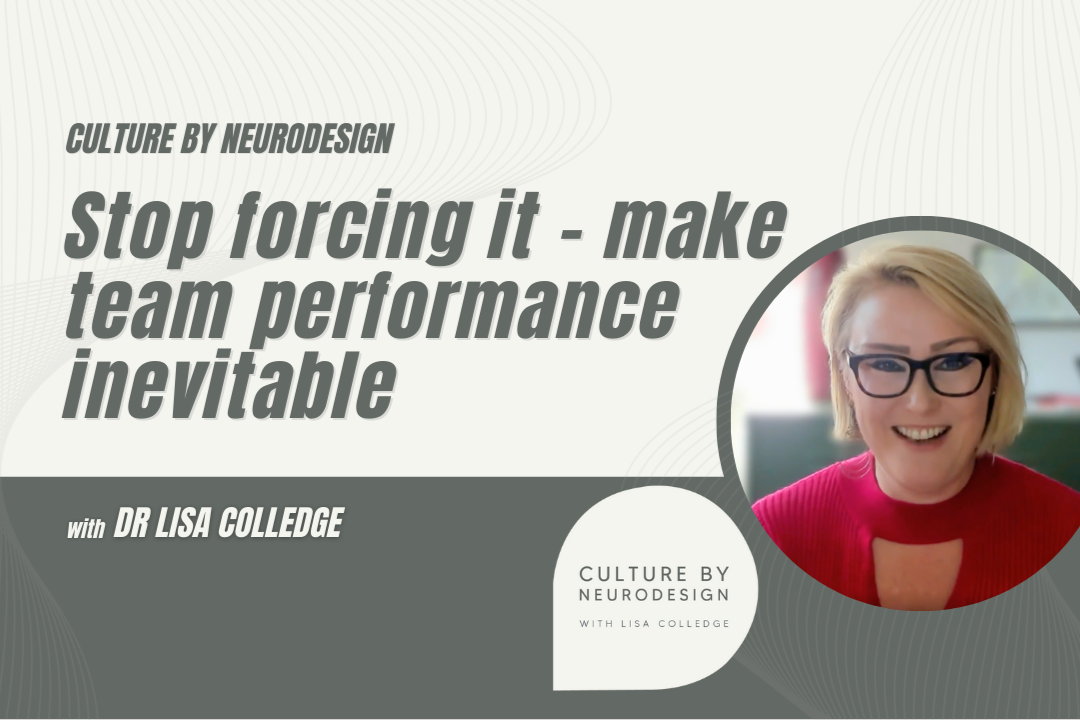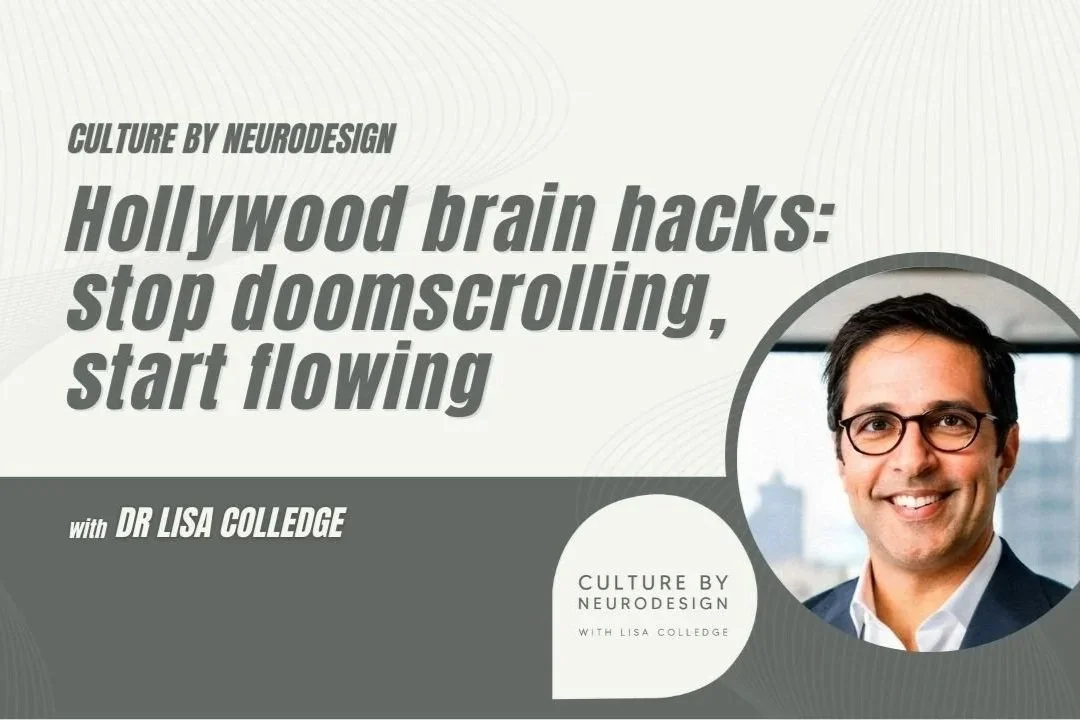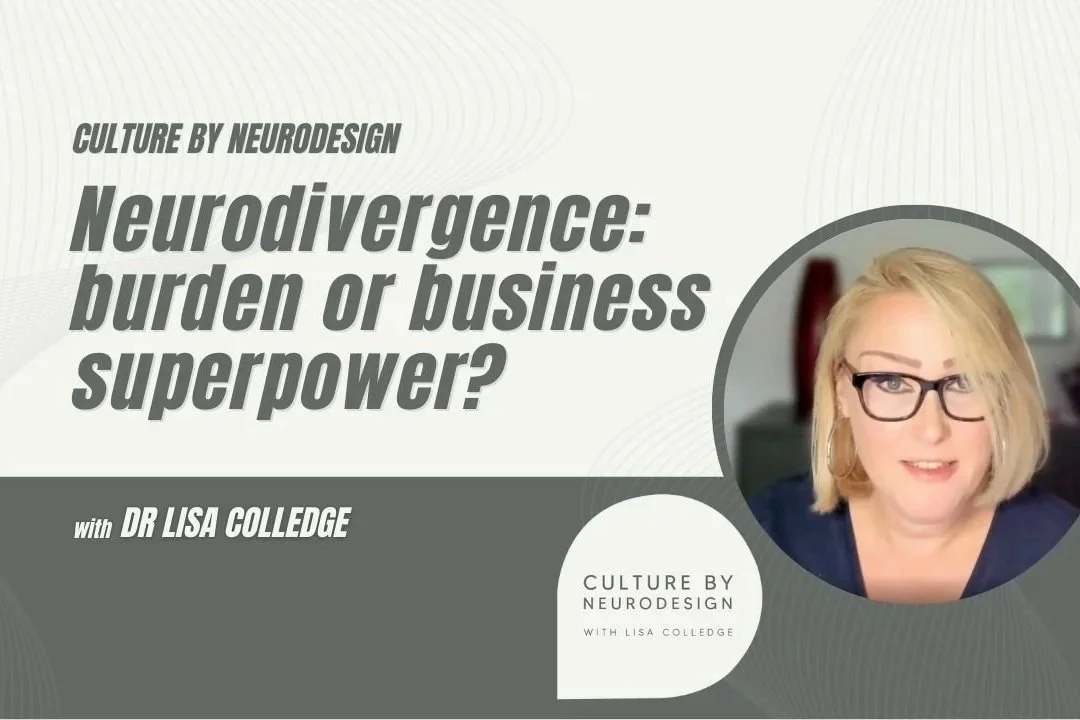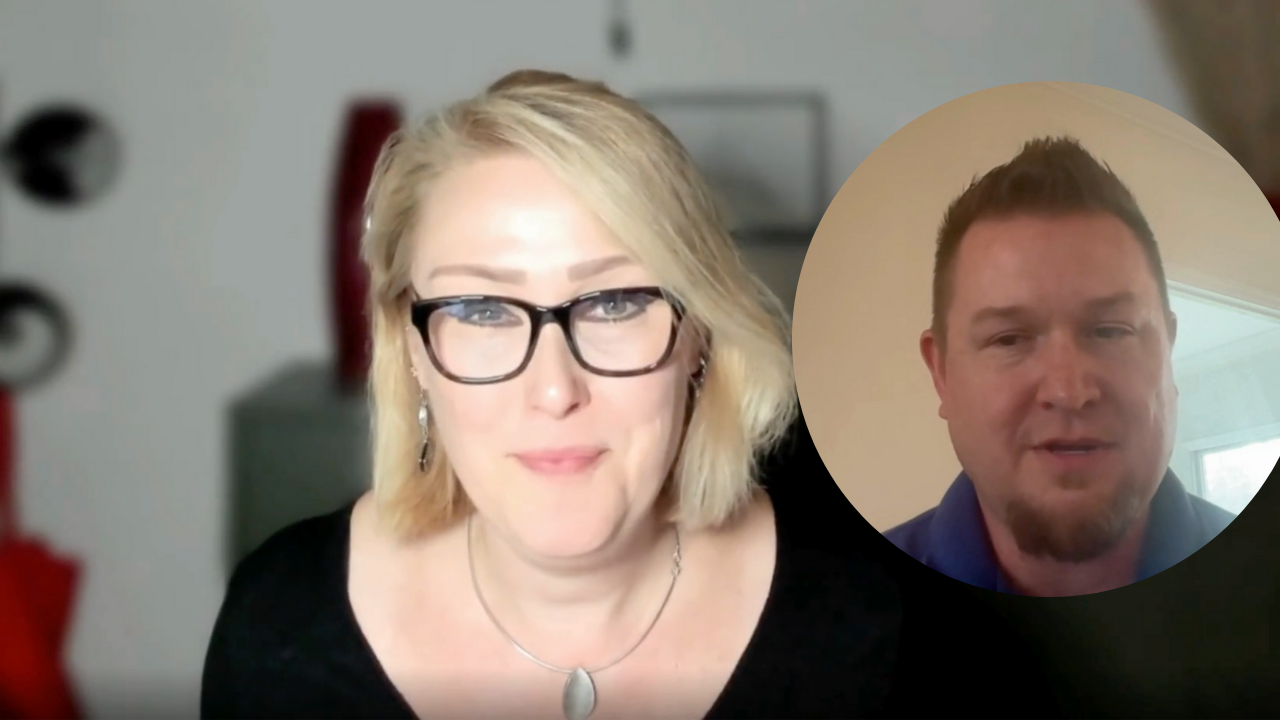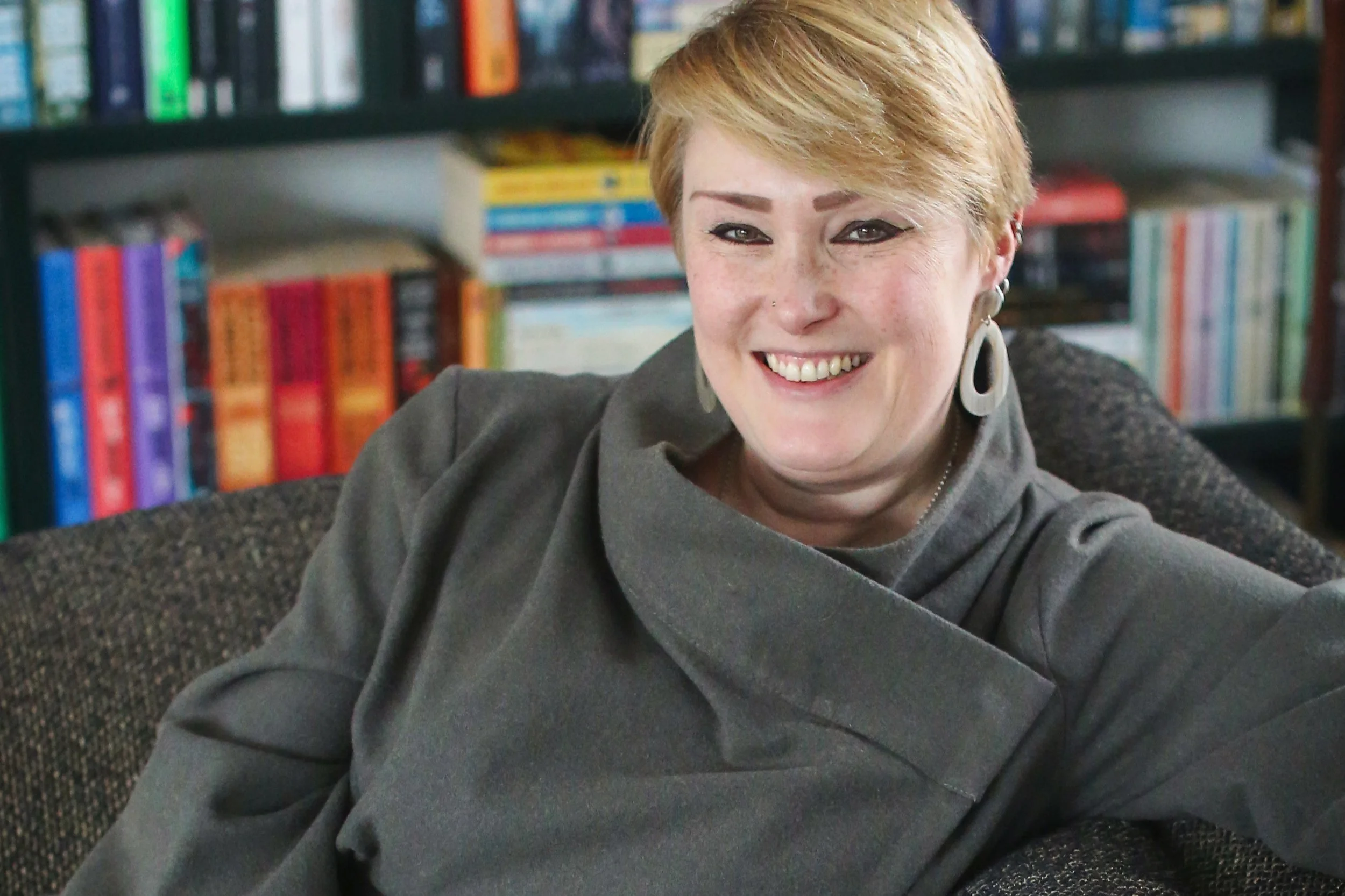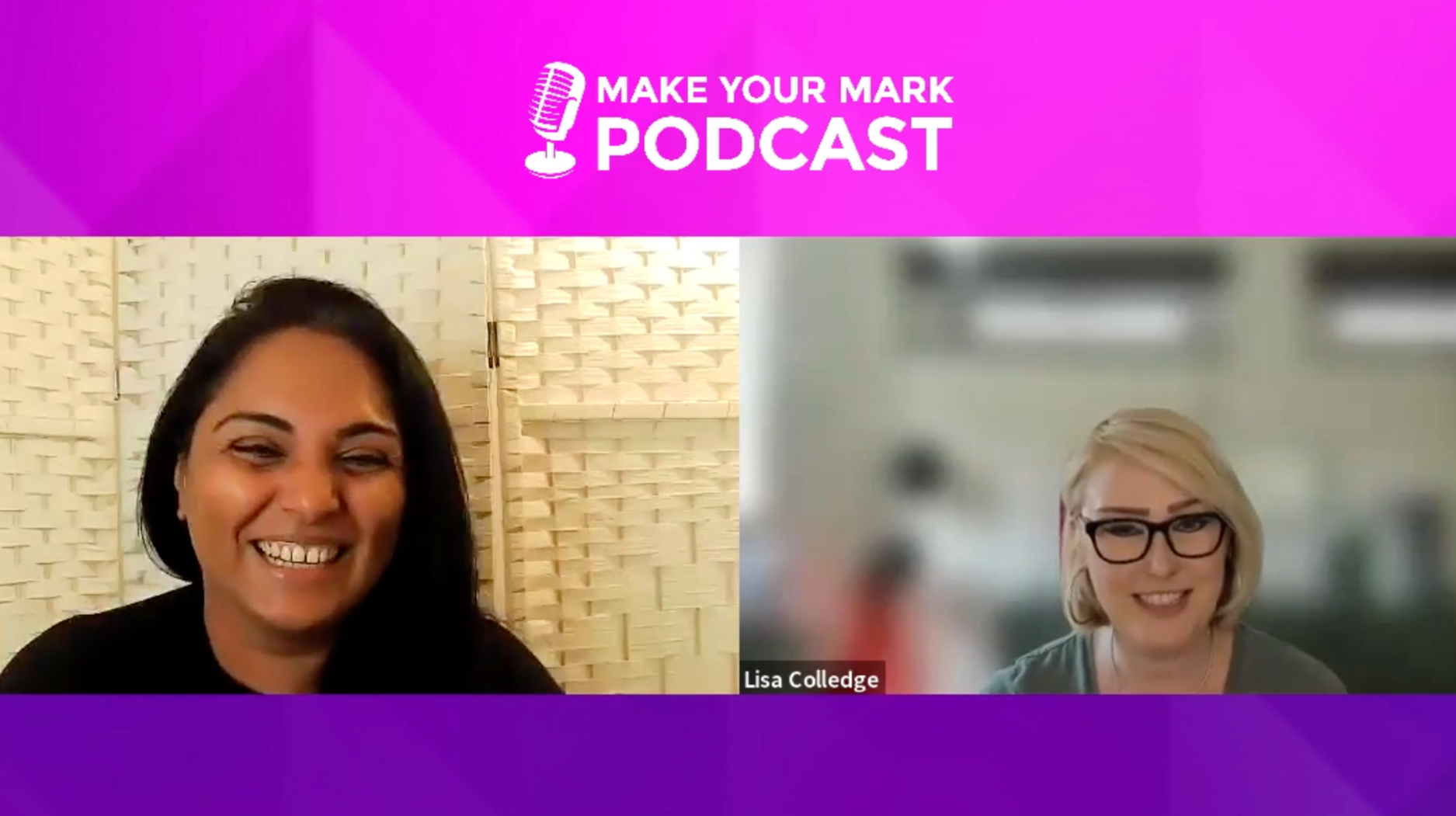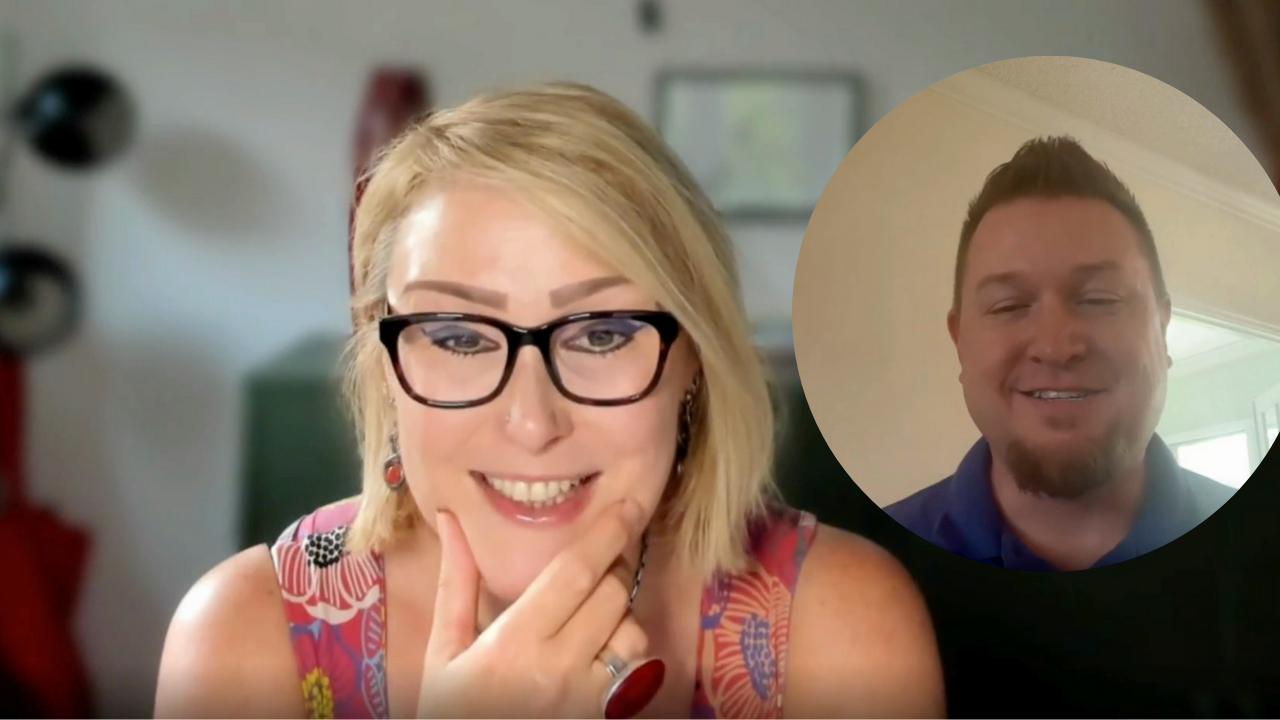Listen and subscribe on your favorite podcast platform. Watch the full recording and read along in the posts below.
Culture by Neurodesign is the podcast where I share expert insights and conversations with guests on how cognitive inclusion, inspired by neurodivergence, transforms working cultures. The result? Teams that are happier, healthier, and able to perform at their best.
Drawing on practices that support neurodivergent thinking styles like autism, ADHD, and dyslexia, I explore how leaders can design resilient, innovative environments where every team member, whatever their neurostyle, can contribute their best and thrive.
From proactive culture design (“design over disclosure”) to creating performance infrastructure that supports diverse neurostyles, this podcast brings you practical, evidence-informed strategies for the modern leadership playbook.
Whether you’re building a new team, resetting culture, or addressing systemic performance challenges, Culture by Neurodesign gives you the tools to create Neuro-Inspired Teams™ and turn invisible effort into lasting impact.
Season 1 is now complete, and the podcast is currently on pause.
If you’d like to stay connected in the meantime, please subscribe to my free newsletter The Neuro-Inspired Question below and I hope you’ll enjoy exploring Season 1 episodes here.
Episode 59: Season 1 reflection: the three themes you connected with most
In this special Season 1 finale of Culture by Neurodesign, Dr Lisa Colledge reflects on a full year of episodes and explores three themes that have resonated deeply with listeners. These themes have shaped conversations and directions behind the scenes, and they point clearly toward where leadership and neuro-inclusive culture design are heading in the most forward-looking organizations.
Episode 58: Freedom within a framework: how autism-inspired design builds neuro-inclusive culture without disclosure
Neuro-inclusive design thrives on balance, freedom within a framework. Dr Lisa Colledge explores how structure creates safety while flexibility fuels energy, helping every neurostyle, from autistic to ADHD, to thrive. Drawing lessons from Schiphol Airport’s trust-based systems, she shows how design, not disclosure, builds cultures of inclusion, productivity, and psychological safety.
Episode 57: Progress over perfection: airports show us the way from autism to neuro-inclusive culture
Real neuro-inclusion doesn’t start with a perfect plan, it starts with progress. Inspired by a flight from Schiphol with her autistic son, Dr Lisa Colledge shares how flexible, human-centered design creates inclusion that works in real life. Discover how agile leadership, neuro-inclusive design, and trust-based systems fuel accessibility, team performance, and lasting cultural change.
Episode 56: Trust over control: autism and universal design at Schiphol airport
A family trip through Schiphol showed how true neurodiversity inclusion works in practice through empathy, clarity, and trust, not paperwork or control. When leaders design cultures around cognitive inclusion and psychological safety, teams become calmer, more innovative, and high-performing. Inclusion by design turns difference into strength and trust into productivity.
Episode 55: Energy by design: how teams can rethink burnout and focus in the age of distraction - with Rich Ellis
Burnout isn’t a personal failure, it’s a design flaw. In this episode, energy coach Rich Ellis and Lisa Colledge explore how leaders can manage energy, not time, to prevent burnout and boost team performance. Learn practical steps to build sustainable energy rhythms, reduce stress, and design neuro-inclusive, high-performing teams.
Episode 54: The ADHD advantage in entrepreneurship, with Peter Shankman
Innovation often leaks in volatile times—not because teams lack ideas, but because energy is drained by systems that don’t fit how different brains work. In this episode of Culture by Neurodesign, New York entrepreneur and bestselling author Peter Shankman shares how reframing his ADHD traits transformed distraction into an innovation engine. From founding HARO to building multiple startups, Peter shows how action, novelty, and speed fuel creativity and growth when environments are designed for neurodiverse thinkers. Leaders can learn three vital lessons: design for focus over control, reward momentum over perfection, and connect diverse brains with trust and clarity. The future of entrepreneurship isn’t about conformity—it’s about leveraging ADHD, neurodiversity, and cognitive inclusion to unlock resilience, innovation, and sustainable performance.
Episode 53: From defensive to Neuro-Inspired: how the best teams thrive in volatile times
Discover how to turn hidden performance drains into measurable impact with neuro-inspired leadership. In today’s volatile workplace shaped by AI disruption, shifting regulations, and generational change, traditional leadership playbooks fail—slowing innovation, draining employee engagement, and reducing productivity. This blog explores how defensive cultures waste energy, why teams fall into the traps of being too “safe” or too “disconnected,” and how leaders can design neurodiversity-inspired cultures that boost resilience, creativity, and performance. By applying cognitive inclusion strategies rooted in autism, ADHD, and dyslexia research, leaders can build future-ready teams where curiosity and care, courage and connection, creativity and structure coexist. Learn how to identify and fix hidden energy leaks, improve employee engagement, and create a high-performing team culture that thrives under change.
Episode 52: Your emails aren’t enough: lessons from neurodiversity and universal design
Rigid communication styles drain energy and reduce impact, especially in today’s fast-paced workplaces. Learn practical strategies for leaders to improve team productivity and employee engagement through neurodiversity-inclusive communication. Learn how the FIT Framework helps reduce hidden energy drains, support autistic, ADHD, and dyslexic team members, and create cognitively inclusive communication systems that boost collaboration and performance.
Episode 51: Autism-inspired communication: fixing hidden energy leaks at work
Neurodiversity in the workplace isn’t just about inclusion, it’s about productivity. Small shifts in communication can reduce hidden energy leaks, improve employee engagement, and boost team productivity. Learn how cognitive inclusion helps teams adapt, innovate, and thrive without burnout.
Episode 50: The new leadership playbook: award-winning universal design for ADHD, dyslexia, and autism
Celebrate 50 episodes of Culture by Neurodesign with award-winning leadership consultant Dr. Lisa Colledge, named Leadership Consultant of the Year 2025. Discover five innovations for building high-performing teams: neurodivergence inclusion, culture over compliance, Neuro-Inspired Teams™, the Future-Ready Pathway™, and the FIT Framework. Learn how neuro-inclusive leadership boosts performance, resilience, and innovation.
Episode 49: Steven Puri on flow, focus and productivity: brain hacks from Hollywood and tech
Academy Award–winning producer turned tech leader Steven Puri reveals productivity hacks to unlock the flow state, improve focus, and finish high-value work. From Hollywood discipline to startup innovation, he shares how leaders and teams can reduce distractions, boost workplace performance, and build sustainable success. Learn how neuro-inclusive leadership and flow design fuel innovation, resilience, and growth.
Episode 48: What the neurodivergence? Sabine van Ditzhuizen puts me on the spot about neuro-inclusive design
Dr. Lisa Colledge explores why neurodiversity should be at the heart of every inclusion strategy. From ADHD creativity and autistic pattern recognition to dyslexic big-picture thinking, she shows how neuro-inclusive design boosts innovation, retention, and performance without relying on disclosure. Practical, scalable, and future-ready.
Episode 47: Flow state and fast brains: balancing creative flow with rigorous structure – a discussion with Nick Cawthon
UX specialist Nick Cawthon shares how his “fast brain” finds creativity in flow states, why burning mental bridges fuels innovation, and how working with structured thinkers turns ideas into impact. This conversation explores the power of neurodiverse teams, combining rapid idea generation with precision and detail, to build adaptability, resilience, and high performance in design, AI, and beyond.
Episode 46: Designing for difference: lessons from two restaurants getting autism inclusion right - a discussion with Will Savell
What does real autism inclusion at work actually look like? Will Savell spotlights two East Tennessee restaurants quietly leading the way. Without using buzzwords or formal programs, they model neuro-inclusive workplaces through clarity, consistency, and strengths-based design. From calm kitchens to flexible roles and emotionally safe leadership, these businesses show how everyday decisions can create lasting impact for employees, customers, and communities.
Episode 45: From autism diagnosis to entrepreneur: finally, inclusion that works for everyone
Discover why neuro-inclusive design isn’t just good ethics, it’s smart business. By enabling every neurostyle to thrive, teams unlock innovation, adaptability, and wellbeing. If you want to build high-performing teams where inclusion drives results, this is the insight you need.
Episode 44: Neuro-inclusion 101: a conversation with Kay Suthar on what leaders miss
Discover how neuro-inclusive leadership transforms team trust, engagement, and performance. In this interview with Kay Suthar, Dr. Lisa Colledge shares real-world strategies, the personal story behind her business, and practical tips leaders can use today without requiring a diagnosis.
Episode 43: ADD in the age of DEI backlash: a real-life look at burnout and belonging, with Will Savell
What does true inclusion look like beyond checkboxes and buzzwords? Will Savell shares his powerful journey through ADD, burnout, masking, and personal reinvention. From being labeled “learning disabled” to rising into executive leadership, his story reveals the hidden toll of success built on suppression and the freedom that comes from embracing neurodivergence. This candid conversation explores what it really takes to feel seen and supported at work, and offers a practical, human-centered approach for leaders who want to respond with empathy and build truly neuro-inclusive teams.
Episode 42: Neurodivergent thinking is a business strategy, not a sympathy play: discussion with Robert Annis
Discover how neurodivergent talent like autistic thinkers drives innovation, cognitive diversity, and competitive advantage. Dr Lisa Colledge and psychologist Robert Annis explore neuro-inclusion, leadership strategy, and how diverse brains fuel growth, resilience, and long-term business success.
Episode 41: How to design a brainstorm for autistic and ADHD thinkers - and everyone else
Most brainstorms are designed for extroverts and fast talkers, excluding introverts, autistic, and ADHD thinkers. Dr Lisa Colledge shares a neuro-inclusive brainstorm strategy to unlock every team member’s ideas before, during, and after the session to fuel innovation and diverse thinking.
Episode 40: My ADHD team lead is unbearable during deadlines. What can I do?
Discover how neuroinclusive team design can resolve friction and burnout without relying on diagnosis or labels. When ADHD traits clash with team expectations, the problem is not personality but a lack of shared norms. This blog explores how the FIT Framework—Fair, Intentional, Team-minded—helps teams align communication, manage different neurostyles, and create a high performing inclusive team culture for everyone.











